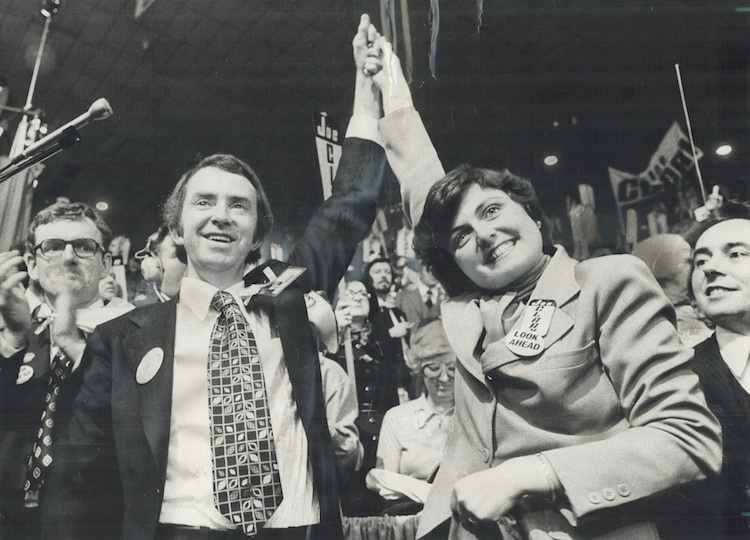Who knew? It’s 1976 all over again! Joe who?…I mean, Andrew who?
I feel good about this…1976 was a pretty good year, as I dimly recall. (You know what they say: If you remember it clearly, you weren’t there.)
On February 22, 1976, after four ballots, members of the Progressive Conservative Party of Canada elected this 36-year-old MP from Alberta named Joe Clark. He beat Claude Wagner, the front-running candidate from Quebec who as a tough-on-crime hard-ass appealed to the Tory party’s right wing.
Basically, nobody had any idea who Clark was, and, in those days, there was no Google, so you really had to scramble to put a story together in time for deadline. The headline on the Toronto Star the next day famously read: Joe Who?
Dear readers, do you see a pattern emerging here?
This evening the slightly re-named and considerably reconstituted Conservative Party of Canada announced the selection of a new leader, a 38-year-old MP from Saskatchewan named Andrew Scheer. He beat Maxime Bernier, the front-running candidate from Quebec who as a market-fundamentalist fruitcake appealed to the Tory party’s right wing.
Basically, nobody has any idea who Scheer is, but now we have Google, so no one who needs to find out has to go bothering the librarians in some mouldy old newspaper morgue.
Scheer is a social conservative — a favourite of opponents of reproductive rights, although not the favourite. (That was Brad Trost, also a Saskatchewan MP.)
He’s no environmentalist — indeed, he’s death on Prime Minister Justin Trudeau’s carbon tax. He once praised loony right Republicans Marco Rubio and Ted Cruz as “strong conservative voices’ — so I suppose there’s a hint there about his economic views.
But he’s not quite as nutty on the economic file as Bernier, doesn’t have a TV reality show like contest quitter Kevin O’Leary, and doesn’t appear to be a divisive bigot like candidate Kellie Leitch. And unlike would-be tough guy Steven Blaney, the apple-cheeked victor doesn’t actually look scary enough to make small children cry.
Don’t worry, we’ll know a lot more about Scheer in a few hours — the mainstream media is already spinning him as a sure-fire Trudeau beater, which is worth a muted chuckle. That he won’t be as easy to defeat as Bernier doesn’t mean he won’t be easy for Trudeau to defeat, I’m afraid, unless the NDP can come up with a stronger leadership candidate some time in the next 38 days. Like Clark, Scheer has all the charisma of a wet dishcloth.
That said, being a compromise candidate has worked for Scheer once before — he was elected as Speaker of the House of Commons in 2011, the youngest person ever to hold that job, and served there until the October 2015 election that sent Stephen Harper’s Conservatives packing. So…who knows?
Apparently it took 13 ballots to come to this conclusion, but the process the Conservatives used to calculate their votes was so complicated and convoluted it stripped Saturday’s convention of all of the drama and most of the suspense normally associated with such events.
One thing’s for sure, Canadians were not glued to their TV sets yesterday. Only the National Post‘s correspondent — who described the boring process as “nail biting” — seemed to have been affected. A manicure is recommended as therapy.
The nation is grateful that the yearlong Tory leadership race is over, though, and Canadians from coast to coast to coast can at last say…“Huh?”
Clark turned out to be a nebbish — that is, from the Yiddish, “a person, especially a man, who is regarded as pitifully ineffectual, timid, or submissive.” He became prime minister on June 4 of 1979, but his Tories fell six seats short of a majority.
Is Scheer a nebbish too? To be fair, we should probably reserve judgment for a little while. (Clark could actually be pretty sharp tongued. He once quipped: “A recession is when your neighbour loses his job. A depression is when you lose your job. Recovery is when Pierre Trudeau loses his job.” Scheer’s version, considerably lamer: “Sunny ways don’t pay the bills.”)
Clark sprang from the “Red Tory” wing of the old PC Party of Canada. The Tory party right wing is considerably further right now than it was in 1976, which means the centre — whence, we are sure to be given the impression Scheer has sprung — is considerably further to the right as well. Indeed, since Harper got done with the party, there really are no Red Tories in it any more. The Canadian electorate, meanwhile, has for the most part remained stubbornly in the middle.
Clark bumbled along as leader of the Opposition until the election of 1979, and then foolishly decided to govern as if he had a majority. He refused to grant the Social Credit Party, which had six seats and might have supported him, official party status. Accordingly, Clark’s government was defeated on a motion of non-confidence on December 13, 1979.
Bitterly, some of the government’s supporters accused Clark of not being able to do the math — something that is apparently a chronic problem for Alberta Conservatives.
In the 1980 election, Clark was defeated by the prime minister he had defeated, Pierre Trudeau. Conservative supporters saw this as a tragedy.
It remains to be seen if Karl Marx was right and this time history will be repeated under Scheer…as farce.
This post also appears on David Climenhaga’s blog, AlbertaPolitics.ca.
Image: Toronto Public Library
Like this article? rabble is reader-supported journalism.




